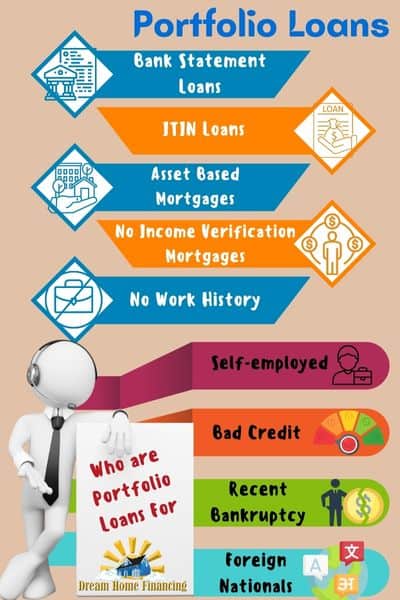Portfolio Lenders

Portfolio loans have become more mainstream after the housing bubble in 2008. Prior to that time, most lenders sold the loans they originated in the secondary investment market. Today, the loans that are considered to be risky are retained by the lender in their own portfolio.
What is a Portfolio Loan?
A portfolio loan is a mortgage that a lender holds onto in their investment portfolio after closing. Portfolio loans are non-conventional loans that do not meet Fannie Mae or Freddie Mac guidelines.
These loans do not meet conventional guidelines because the borrower has bad credit, a recent bankruptcy, or cannot fully document income. Since non-conventional loans are difficult to sell in the secondary market, these loans are kept within the lender’s portfolio which is why they are called portfolio loans.
The most popular portfolio loan today is the bank statement loan. This loan program was created for self-employed individuals who cannot qualify using the net income on their tax returns.
What is a Portfolio Lender?
A portfolio lender offers non-conventional mortgages or subprime loans to borrowers who cannot qualify for a conventional mortgage due to various credit or income deficiencies. Portfolio lenders will design these loans so the profit from the interest and fees creates an incentive for them to hold and service the loans within their own investment portfolios.
Click to speak with a portfolio lender
Who are Portfolio Loans For?
If you have good credit, can document your income, and down payment money to qualify for a conventional or government mortgage, then a portfolio lender is probably not what you are looking for. However, if any of the situations below apply to you, then a portfolio lender can likely help you with your mortgage.
- Bankruptcy discharged less than two years ago
- Foreclosure within the past three years
- Bad credit scores
- Recent late payments on another mortgage
- Tax liens or judgements
- Self-employed
- Unable to provide tax returns
- Foreign nationals with no social security number
List of Top Portfolio Lenders
These portfolio lenders are known to have a wide variety of mortgage products to fit borrowers who cannot meet the minimum standards for a conventional mortgage.
- First National Bank of America – FNBA offers portfolio loans in all 50 states. They have bank statement loans, asset depletion loans, and ITIN loans for borrowers who do not have a social security number. They recently raised their minimum credit score requirements and their rates are just a bit higher than other lenders.
- Citadel Servicing – Citadel is not licensed in every state but they do offer portfolio loans. They have bank statement loans and ITIN loans.
- Carrington Mortgage Services – Carrington is a national lender that offers conventional, government and portfolio loans. They have programs for self employed borrowers and also those with a recent bankruptcy.
- Ocean Lending – Ocean lending offers portfolio loans for individuals with a recent credit event and allow for credit scores as low as 500. They also offer hard money loans.
It is important to understand that each of these lenders will over various products that may or may not apply to you. They also change their programs often.
We are well connected with the portfolio lenders in the industry. Let us help you to determine which lender is the best fit for your situation. Simply complete the loan scenario form and we will get back to you with some options.
Types of Portfolio Loans
There are various types of mortgages that are considered to be “portfolio loans” which are not offered by must local banks. These portfolio loans are for special circumstances for borrowers who are unable to get approved by conventional lenders.
Bank Statement Loans – Bank statement loans are for self employed home buyers who cannot qualify because they write off too much on their tax returns. The portfolio lenders who offer this program will evaluate their application based upon the average monthly deposits into the bank statements. Read more about bank statement loans.
ITIN Loans – Immigrants who have an ITIN instead of a social security number can qualify for this mortgage to purchase or refinance a home. ITIN card holders otherwise would not qualify for a conventional or FHA loan due to their residency status. Read more about ITIN loans.
Recent Bankruptcies – Home buyers with a recent Chapter 7 or Chapter 13 bankruptcy can qualify for this type of bankruptcy portfolio loan when other lenders would ask for a long waiting period. A mortgage after a bankruptcy is possible just one day after your discharge.
Asset Based Mortgages – Mortgages that look at liquid assets rather than income are called asset depletion loans. Lenders will look at your net liquid assets to determine how much you will qualify for.
No Income Verification Mortgages – No income verification or no doc loans are for applicants who cannot or prefer not to document their income. The down payment and interest rates will be higher than a conventional loan.
No Work History – If you do not have a two year work history, you may apply for a portfolio loan that does not require the two years. It is a similar program to the no income verification mortgage. Credit scores and assets will be an important factor in your ability to qualify.
Pros and Cons of Portfolio Loans
There are advantages and disadvantages associated with portfolio loans. We will out line the most common facts that you need to know before you decide whether a portfolio loan is right for you.
Pros
- Can qualify with lower credit scores
- Can get approved with a recent bankruptcy, foreclosure or short sale
- Typically no PMI for down payments less than 20%
- Debt to income ratios can be higher
- No tax returns needed
Cons
- Interest rates higher than conventional mortgages
- Pre-payment penalties for investment properties likely
- Higher lender fees
Keep in mind that these pros and cons may not apply to every portfolio lender or portfolio loan. These are also just a few examples of portfolio lenders we work with. Their guidelines and product offerings change often.
Portfolio Loan Interest Rates
One of the cons of a portfolio loan will be interest rates that are a bit higher than conventional or government loans. Each lender will have different rates based upon their need to offset the risk of keeping the loans within their own investment portfolios.
The down payment amount and credit scores are two major factors that determine your interest rate. The more you put down and the higher your interest rate, the lower your interest rate will be.
Some portfolio lenders either require a larger down payment or charge a higher interest rate for lending in areas they consider to be higher risk. Two examples of high risk lending locations are Chicago and New York.
The bottom line is that you can buy your dream home with a portfolio loan and your interest rate will be slightly higher than what you would get with a conventional loan.
Portfolio Loan Fees and Closing Costs
One of the things you need to expect with a portfolio loan is higher lender fees. You may see origination fees of up to 2% and possibly points as well. Underwriting fees and other lender based fees are likely but some of these fees are also common with conventional loans.
Plan on budgeting anywhere from 2%-5% of the loan for closing costs which include the lender fees.
Investment or Rental Portfolio Loans
Portfolio loans are also available for investment properties. For investment properties, portfolio lenders may require a larger down payment than what would be required for a primary residence.
Investment property portfolio lenders will help you with residential 1-4 unit properties. In some instances, you may be able to qualify based upon the future cash flow of the building. Let us connect you with one of our portfolio lenders to discuss your options.
Summary
According to a the journal of real estate research, portfolio lenders play a significant role in real estate. In today’s environment of an increased number of people with bankruptcies and poor credit scores, portfolio loans are absolutely essential to maintain a stable real estate market. Without portfolio lenders offering these loan programs, there could be another market crash.
As a home buyer, you can purchase your dream home even if you cannot qualify for a conventional or government loan. Portfolio lenders can help to provide the financing that you need today.
Related Articles
Mortgages for Self Employed Borrowers
Discussion Topics
We can help you to find a portfolio mortgage lender in the following states: Alabama, Alaska, Arizona, Arkansas, California, Colorado, Connecticut, Delaware, Florida, Georgia, Hawaii, Idaho, Illinois, Indiana, Iowa, Kansas, Kentucky, Louisiana, Maine, Maryland, Massachusetts, Michigan, Minnesota, Mississippi, Missouri, Montana, Nebraska, Nevada, New Hampshire, New Jersey, New Mexico, New York, North Carolina, North Dakota, Ohio, Oklahoma, Oregon, Pennsylvania, Rhode Island, South Carolina, South Dakota, Tennessee, Texas, Utah, Vermont, Virginia, Washington, West Virginia, Wisconsin, Wyoming

